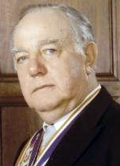 |
Balthazar Johannes Vorster
b. 13 Dec 1915, Jamestown, Cape Province
d. 10 Sep 1983, Cape Town, Cape Province |
| Title: |
State President of the Republic of South Africa :: Staatspresident van die Republiek van Suid-Afrika |
| Term: |
10 Oct 1978 - 4 Jun 1979 |
| Chronology: |
29 Sep 1978, elected, session of an electoral college consisting of the members of the Senate and the House of Assembly, Cape Town [1] |
| |
10 Oct 1978, took an oath of office as State President, public ceremony, Groote Kerk, Pretoria [2] |
| |
4 Jun 1979, resignation became effective immediately upon its announcement by the Prime Minister 4 Jun 1979 [3] |
| Names/titles: |
Also known as John Vorster |
| Biography: |
| Born into an Afrikaner farmer's family; started his education at the Spitskop farm school in the Jamestown district; attended Sterkstroom high school, Cape Province, matriculating in 1933; entered Stellenbosch University to study law; took sociology classes under future Prime Minister Hendrik Verwoerd and retained a life-long connection with him in politics; made his mark as a speaker during his term as chairman of the university debating society; graduated as Bachelor of Arts (1936) and Bachelor of Laws (1938); worked as registrar to the judge president of the Cape division of the Supreme Court; started a law practice in Port Elizabeth; was one of the founders of the Ossewa-Brandwag (Ox-wagon Sentinel), organisation which was launched to preserve the culture and traditions of the Afrikaners and opposed South African participation in the war; detained for his anti-war activities without trial and then held for 17 months at an internment camp (1942-1943); released and opened a law practice at Brakpan, Transvaal; joined the Afrikaner Party; stood as an independent candidate and narrowly lost election to the House of Assembly (1948); after the merger with the Reunited National Party (Herenigde Nasionale Party) into the National Party (Nasionale Party) he was elected to the House of Assembly as a representative of Nigel (1953-1966); acquired a reputation as a formidable debater; called to the bar at Johannesburg in 1953 and continued as an advocate until 1958; as an enthusiast of the Broederbond, he helped organise the election victory of Johannes Gerhardus Strijdom in 1954; appointed deputy minister of education, arts and science, and of national welfare and pensions in the government of Verwoerd (1958-1961); served as minister of justice (1961-1966), and minister of justice, police and prisons (1966); introduced the General Law Amendment Act ("Sabotage Act") and other measures against subversion; was elected Leader of the National Party (1966-1978) and appointed Prime Minister (13 Sep 1966 - 1978) after the assassination of Verwoerd; proved more pragmatic than his predecessor, pursuing a more flexible foreign policy which sought to establish friendly relationships with African states; his "outward-looking policies" were endorsed in the total defeat of the ultra-right challenge from the Reconstituted National Party (Herstigte Nasionale Party) in the General Election of 1970; his firm control of the party enabled him to secure the acceptance of constitutional proposals providing for the political incorporation of the Coloured and Asians (1977); pursued the policy under which Transkei and Bophuthatswana were declared independent states; played a key role as mediator in the search for a peaceful settlement in Rhodesia; resigned as Prime Minister following the scandal caused by secret government payments for favourable press coverage; was elected State President (10 Oct 1978 - 4 Jun 1979), but resigned when the Erasmus Commission found that he had known about the secret operations. |
| Biographical sources: "New Dictionary of South African Biography", ed. by E.J. Verwey (Pretoria: HSRC, 1995), 1:253-261. |
| |
| [1] |
Government Gazette, No. 6174, 29 Sep 1978, p. 1; Rand Daily Mail, 30 Sep 1978, p. 1. |
| [2] |
Government Gazette, No. 6180, 10 Oct 1978, p. 1; Rand Daily Mail, 11 Oct 1978, pp. 4-5. |
| [3] |
Rand Daily Mail, 5 Jun 1979, p. 1. |

